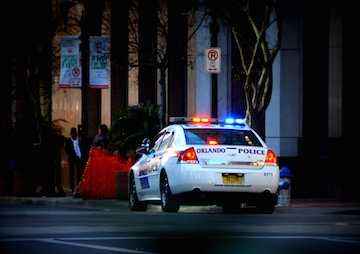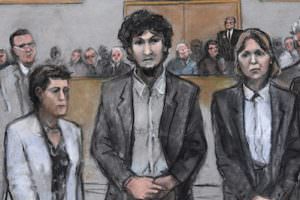False Flag Theories Fly After Tragedies in U.S. and Great Britain
As both countries reel from violent attacks, many people are taking to the internet to discuss possible conspiracy theories. As both countries reel from violent attacks, many people are taking to the internet to discuss possible conspiracy theories. A police car in Orlando, Fla. (Flickr / CC 2.0)
A police car in Orlando, Fla. (Flickr / CC 2.0)
A police car in Orlando, Fla. (Flickr / CC 2.0)
The United States and Great Britain have both seen high-profile incidents of horrific violence in the last week, and both of those incidents seem to be (at least in part) politically motivated. Last Sunday, Americans learned of a gunman killed 49 people at a gay nightclub in Orlando, Fla. Earlier this week, Great Britain was stunned at the murder of lawmaker Jo Cox, who was stabbed and shot following a meeting with her constituents.
In trying to make sense of the deadly Orlando massacre, Americans have pointed to homophobia, mental illness, gun access and Islamic radicalism as some factors that motivated the shooter, Omar Mateen. Reports have surfaced that as Cox’s alleged killer attacked her, he yelled “Britain first!” — the name of a far-right group with a history of militarized training.
But as the world waits to hear more details about these tragedies, a growing number of people are taking to the internet to propose various “false flag” theories.
The term “false flag,” as explained on Wikipedia, “describes covert operations that are designed to deceive in such a way that the operations appear as though they are being carried out by entities, groups, or nations other than those who actually planned and executed them.”
An abundance of internet conspiracies following a national tragedy is nothing new. Look at the aftermath of the JFK assassination, the terrorist attacks of September 11 and even the Boston Marathon.
In the case of the Orlando shooting, an abundance of false flag theories have begun to spread. The Washington Post took the time to debunk many of them. “[T]o someone who has just dropped everything, hopped a flight to Florida and spent three days interviewing traumatized witnesses,” the Post wrote, “the notion that the whole thing might be made-up is patently ridiculous.”
As for the tragic death of Jo Cox, the International Business Times breaks down the various “false flag” rumors swirling around social media. “[S]ome supporters of a British exit from the EU are spreading a conspiracy theory that the suspect … is a patsy of pro-EU forces, and that Cox’s murder is a ‘false flag’ aimed at portraying the British right as unhinged and dangerous.”
There are psychological explanations for these sort of responses to tragedy. The New York Times explains:
Economic recessions, terrorist attacks and natural disasters are massive, looming threats, but we have little power over when they occur or how or what happens afterward. In these moments of powerlessness and uncertainty, a part of the brain called the amygdala kicks into action. Paul Whalen, a scientist at Dartmouth College who studies the amygdala, says it doesn’t exactly do anything on its own. Instead, the amygdala jump-starts the rest of the brain into analytical overdrive — prompting repeated reassessments of information in an attempt to create a coherent and understandable narrative, to understand what just happened, what threats still exist and what should be done now. This may be a useful way to understand how, writ large, the brain’s capacity for generating new narratives after shocking events can contribute to so much paranoia in this country.
“If you know the truth and others don’t, that’s one way you can reassert feelings of having agency,” Swami says. It can be comforting to do your own research even if that research is flawed.
Of course, there are also going to be legitimate questions left unanswered after tragic events like the ones mentioned above. For example, there is serious speculation that the FBI failed in several aspects of the Orlando shooting. And it’s always important to keep a critical eye when taking in mainstream media.
Stephen Lewandowsky, a professor of psychology at the University of Bristol, said: “Paradoxically, it is much easier for people to accept the idea of a government conspiracy than it is to believe that it was just a random act. I think that’s what’s driving this, in part—the need to control your fear of random evilness. It’s much a better picture to have an enemy whom you can blame.”
—Posted by Emma Niles
Your support matters…Independent journalism is under threat and overshadowed by heavily funded mainstream media.
You can help level the playing field. Become a member.
Your tax-deductible contribution keeps us digging beneath the headlines to give you thought-provoking, investigative reporting and analysis that unearths what's really happening- without compromise.
Give today to support our courageous, independent journalists.





You need to be a supporter to comment.
There are currently no responses to this article.
Be the first to respond.